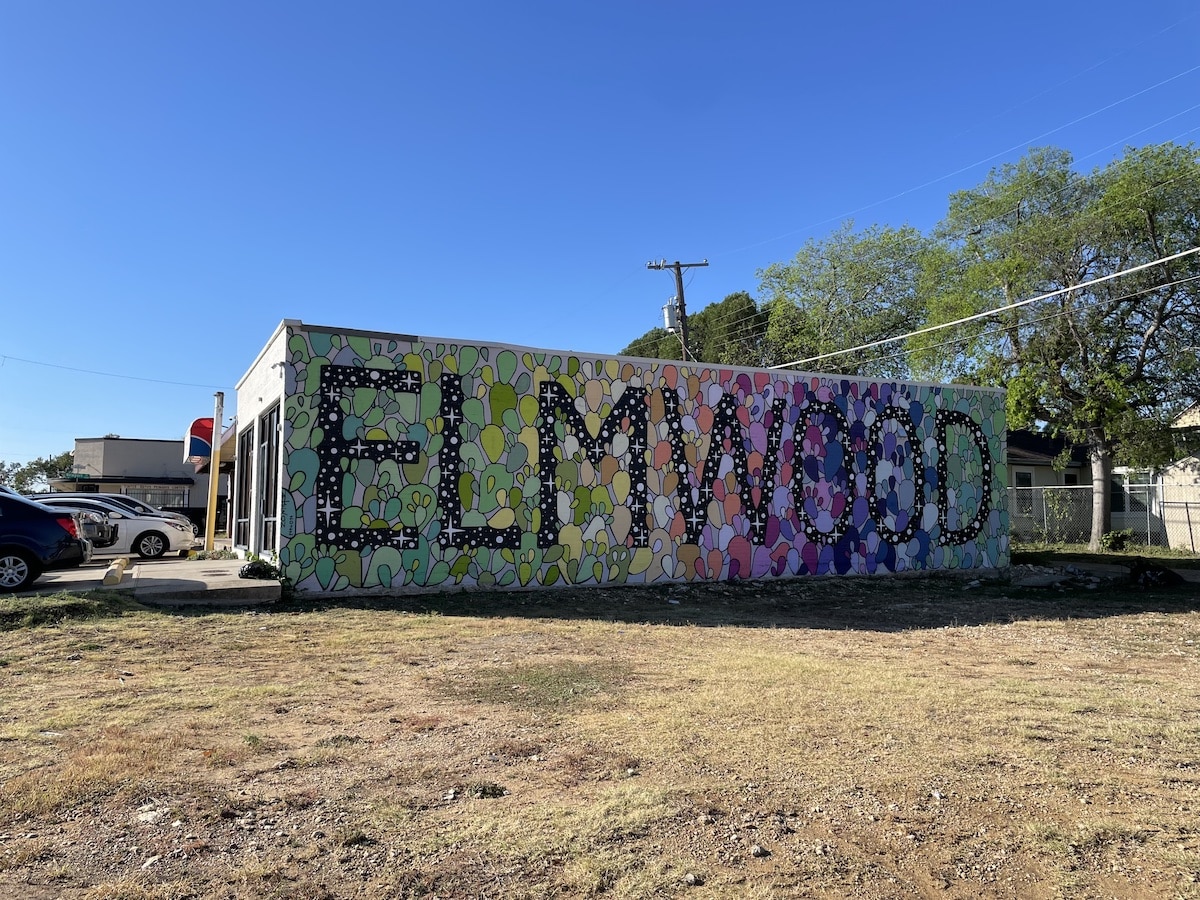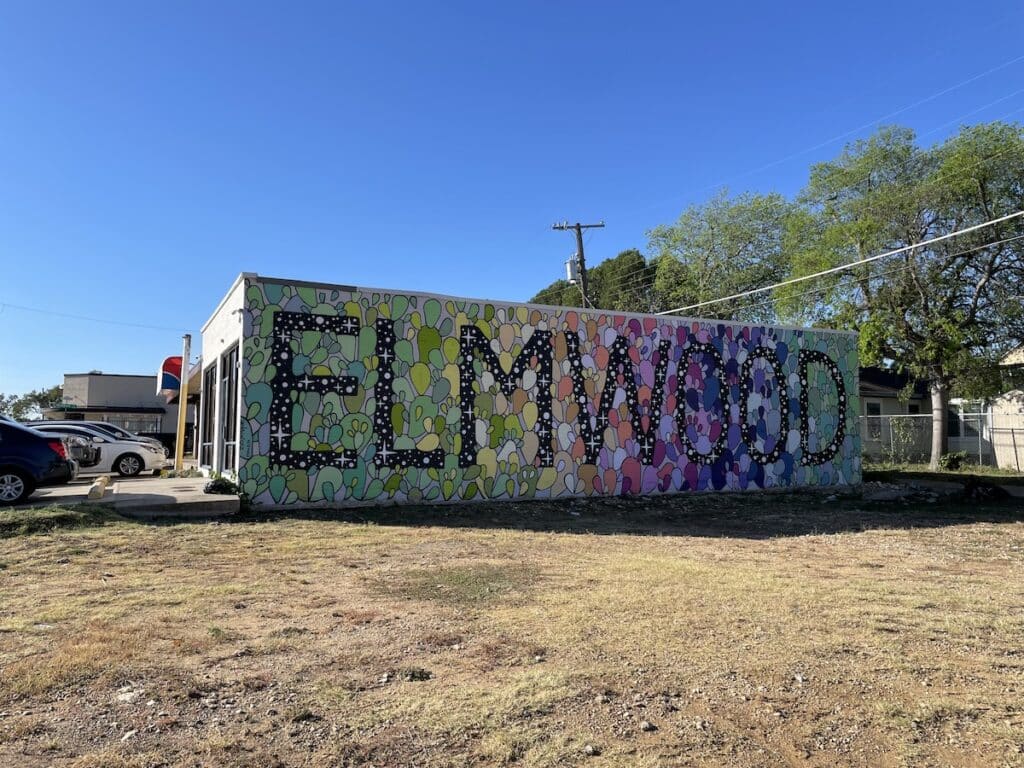This Dallas Coffee Shop Wants to Build Community. The City Wanted It to Build Parking Spaces.
In Elmwood, Graph Coffee’s opening has been delayed for months because of a city code that dates back to 1965.

When Germán Sierra purchased the home at 1805 S. Edgefield Ave. in October 2020, he hoped one day he could turn it into a community-focused coffee shop for the Elmwood neighborhood in Oak Cliff. Sierra is the owner and roaster of Graph Coffee, which has been producing wholesale and retail coffee beans in Dallas since 2017. He began renovating the three-bedroom home after years of contemplating whether he should expand his business into a brick and mortar location.
The house was revamped over the course of about a year, and today almost every part is brand new: the siding, windows, drywall, plumbing, electricity. The original exterior had bits of peeled paint and severely overgrown shrubs. Today, it has sleek matte black paint and neatly trimmed plants. A railing was installed alongside the front steps for guests.
Sierra hoped to open the shop by spring 2022 with his friend and coffee buyer, Weston Stewart. But a plan review from the city threatened the coffee shop’s opening. Due to an outdated parking code regulation, Sierra was required by the city to have 18 parking spots to accommodate its more than 1,600 square feet of restaurant space (which includes 400 square feet of a detached garage). Current city code requires at least one parking space for every 100 square feet for restaurants.
Elmwood is one of the largest residential neighborhoods in Oak Cliff. Graph is perched at the northern tip of the neighborhood’s downtown district, which is dotted with restaurants, auto shops, hair salons, and other businesses within walking distance of some 1,500 homes. Small parking lots with three or four spaces are paved in front of most buildings, though on any given day, cars are parked along Edgefield Avenue, the main street that runs through downtown Elmwood to points north and south.
The building lot is about 6,300 square feet, and an average parking spot takes up about 350 square feet. Simply put: the math wouldn’t work. The plan review decision required an appeal to the city’s Board of Adjustments, kickstarting an unexpected monthslong delay for Graph’s opening.
“I always heard people saying the city is a pain to deal with when it comes to permits and reviews, but I never realized it was going to be this difficult,” Sierra says.

Sierra learned about craft coffee after he traveled and worked in Portland, Oregon, for several years. He describes the experience as an “unveiling moment.”
“Portland is obviously the mecca of specialty coffee, at least for the U.S.,” he says. “In Portland, I [was] being introduced to Ethiopian coffee for the first time and drinking black coffee for the first time and actually enjoying it. That was kind of the beginning of the rabbit hole for me.”
Shortly afterward, he met Stewart, a server at The Joule Dallas. Stewart says he learned about coffee through a guest at the hotel, and after he met Sierra, he became a coffee buyer for Graph. Graph sells beans from Ethiopia, Colombia, and Peru bagged whole or in a fine espresso grind. After four years of behind-the-scenes coffee operations, the pair agreed it was time to set up a shop.
Sierra knew he wanted to own his own property; any obstacles he may encounter would at least be a problem he could attempt to fix himself instead of relying on a landlord. He often drove through the Elmwood neighborhood, catching a glimpse of the lonely house on Edgefield. When a for-sale sign went up, he jumped at the chance.
Renovations were going to be hefty, but because the house was purchased during the pandemic, Sierra and Stewart had plenty of time to work on their future coffee shop. They attempted to do most projects on their own to save a bit of money, and it kept them busy.
“We were doing stuff that we never imagined we would be doing, and obviously we put a lot of our own blood, sweat, and tears into this property,” Sierra says. “It’s hard to believe that we managed to do the physical aspect of this whole project within a year’s time, but now we’ve surpassed that one year, just dealing with paperwork and red tape.”
After renovating the home, the obstacles for Graph came in waves. When Sierra found out he needed to come up with 18 parking spaces, he submitted an appeal to the Dallas Board of Adjustments in February 2022. When the meeting came around in April, Sierra, accompanied by Stewart, suggested providing three of the 18 spaces required by city code. Ahead of the meeting, Sierra also submitted letters of support from residents living near the business.
“We welcome a coffee shop we can walk to,” read one letter. “In the occasion that walking isn’t an option, the street parking options are plentiful.”
One resident living directly across the street from the coffee shop wrote: “I understand that due to the laws written over 50 years ago the city is requiring this house to have a significant amount of parking, which makes no sense and conflicts with the current direction, aspirations, and investments of this neighborhood.”
“I always heard people saying the city is a pain to deal with when it comes to permits and reviews, but I never realized it was going to be this difficult.”
Gérman Sierra, owner of Graph Coffeenormal
Sierra presented letters of support, maps, and images of nearby restaurants with shared parking spaces. The Board of Adjustments told Sierra it needed more information and a traffic study. Sierra did the traffic study himself after approval from a city traffic engineer.
In June, Sierra went back to the Board of Adjustments and presented more of his findings. He discovered the house, built in 1948, was in a community retail zone but had been categorized as a residential building by the Dallas Central Appraisal District. As a residential lot, the land itself doesn’t easily accommodate parking spots, he argued. The detached garage wasn’t going to be used as retail space, and there was ample street parking, he said.
The letters of support came from 33 neighbors within walking distance of the property. Most importantly, the city’s traffic engineer didn’t see an issue with Sierra’s traffic study results. But it wasn’t enough.
The Board of Adjustments asked Sierra to hire an outside company to conduct another traffic study, which he says cost him about $3,000. The study was performed by Dallas-based engineering company DeShazo Group in July 2022. The group concluded that because there was enough parking along the streets near Graph, the city could make a parking exception. Sierra presented the study to the Board of Adjustments in August with approval from the city’s traffic engineer. He was denied again.
“It was definitely a huge letdown,” Sierra says. “I walked in there thinking there was going to be more support from the city of Dallas to recognize what I’m trying to do here and the type of positive impact that it can create for the community, and instead they turned a blind eye to that.”
Councilman Chad West, whose district includes Elmwood, said issues related to the city’s parking code have been ongoing for years. In 2019, a couple who wanted to open a boutique hotel in North Oak Cliff had their plans briefly thwarted by the code after the city required 16 more spots than they had originally budgeted. At the time, West called the code antiquated—it was introduced in 1965 and later codified—and didn’t apply to present needs of the community.
Parking is an issue that comes up once a quarter “at least” since he’s been in office, he says, and plan reviewers spend most of their time dealing with permits and zoning that involve parking.
“Parking is not just something that has stifled growth and small businesses, but the complication of our code is harmful to small businesses and such a time waste for our staff as well,” he said.
In one email thread between Sierra and West dated Feb. 9, 2022, West said a hearing and zoning case for downtown Elmwood to address things like parking requirements had been pending for about three years. The hearing has been proposed for some time in March, according to a timeline provided by West, and resolutions for Elmwood’s development will follow.
The hearings coincide with the approval of the West Oak Cliff Area Plan, a project meant to rezone parts of West Oak Cliff, which includes downtown Elmwood. The Bishop Arts District, northeast of Elmwood, is no stranger to developments, tourism, and high traffic. Elmwood wants to shield itself from that type of density through WOCAP, with a few exceptions.
“We would love to have some of the amenities of Bishop Arts, but Bishop Arts is not for the people of Bishop Arts, it’s for tourists,” says Whitney Marsh, the president of the Elmwood Neighborhood Association. “Our idea for downtown Elmwood is that we would like to make it for small businesses by the people of Oak Cliff, for the people of Oak Cliff.”
Sierra’s goal with Graph is to provide a neighborhood coffee shop for residents in Elmwood, which has been his primary motivation. He wants to build community and provide a place where people can come to learn about, and enjoy, coffee in a comfortable space. He wants to cultivate the same wonderment he had in Portland when he first dove into the coffee world. And he wants to be able to do it without more obstacles.
Instead of going back to the Board of Adjustments, Sierra has chosen to file parts of the building under zoning codes allowing office space and general merchandise or food store. The total parking spaces would come out to four—which fits on the land he has—though it means more construction, more permits, more approvals, and more waiting.
He’s fine with that. At the end of the day, he believes Graph Coffee will happen. Everything else is in the rearview mirror.
“We’re tired of talking about this,” he said. “We want to talk about coffee.”

Article by DMagazine
Author
 Nataly Keomoungkhoun
Nataly Keomoungkhoun
View Profile
Nataly Keomoungkhoun joined D Magazine as the online dining editor in 2022. She previously worked at the Dallas Morning News,…
